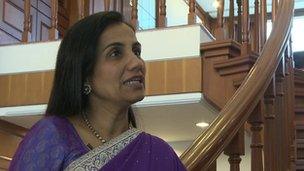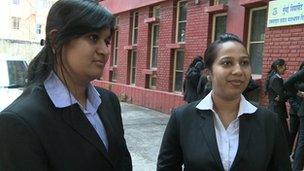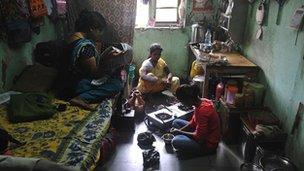Women bankers break through in India
- Published
The chief executive of one of India's largest banks on getting to the top of the corporate ladder
Women have always worked in India, but the rise of the corporate woman in the last two decades in the banking sector has been phenomenal.
India has no fewer than eight female banking bosses - indeed the appointment of Arundhati Bhattacharya as the first chairwoman of the country's largest bank, the State Bank of India, came days before the announcement of the new Federal Reserve nominee in the US, Janet Yellen.
It's a stark contrast to places like the UK, where women run the British arm of international banks, but there are no overall female bosses. So how has India done it?
And the reason for it is very simple, according to Chanda Kochhar, the chief executive of ICICI, the country's second largest bank - the company promoted on merit, not gender.

Chanda Kochhar says women need to make sacrifices to make it to the top in banking
"When you have an organisation that is gender neutral, and when you have a woman who is willing to give to her job whatever it takes, whether it's long hours, whether it's commitment to travel, irrespective of the fact that she's a woman, I think women get that opportunity to rise," she says.
There were, of course, sacrifices. "What it required on my part was to really give to the job whatever it took. So yes, there were children at home, but if the job demands travel, hard work, long hours of work, I think you need to give it."
'Hard work'
ICICI is seen by many within the industry as a training ground for ambitious women. Typically, a third of its intake will be female, and the bank has made a point of nurturing talent and creating a whole crop of successful women. They include Shikha Sharma, chief executive of Axis Bank.
"There's no substitute for meritocracy and there's no substitute for hard work," she says.
"But there is the issue of women having the belief that they can make it, and everybody in society becoming sensitive to the fact that women can make it.
"The presence of more women helps both those beliefs to happen, for women to have the belief, and for society to have the sensitivity to understand that yes, women bring a different level of contribution."
Breaking out
Jamnalal Bajaj Institute of Management in south Mumbai trains those who will be the corporate bosses of the future, and counts Chanda Kochhar as a former student. Each year, the institute takes 125 young men and women, and competition to get in is fierce, with around 1,000 applications per place.

Inspired by role models within banking, students hope to be the corporate bosses of the future
Student Aditi Agarwal says she's very ambitious, but has had her own battles to get on.
"I think women are just tired of being at home, they want to break out of those shackles," she says.
"I can say this from experience - when I decided to study further for my chartered accountancy course, I didn't get a lot of support from my extended family. There was that mindset to have kids, make dinner for your husband - that's what's expected of you.
"But I want to work, I want to make a contribution. I have a personal sense of identity."
Fellow student Ekta Ambekar says there are lots of female role models now in banking, and she's sure she'll have the same chance to succeed as men.
"Women are surely breaking the glass ceiling, and after all it's more about the talent that you have, and less about all the social constraints. It's always the talent and hard work that pays… your work speaks for itself."
'Dream job'
So why has banking distinguished itself when it comes to promoting women?
According to Tarjani Vakil, who was India's first female banking chief executive in the 1990s, the sector expanded in the 1970s when banks were nationalised, and that coincided with increasing numbers of middle-class women entering the workplace. For her, it was lonely being the only woman at the top, but banking was always seen as a good job for women.
"Women joined because it was a dream job for them," she says.
"Banks were well organised. It was a safe place to work, because you didn't have to go to a factory, so the family didn't object. Women went to the office, sat in an air-conditioned office, and were very happy.
"It was glamorous, and money is always glamour."
She says at the outset the ceiling was concrete rather than glass, but that now it's been well and truly smashed.
The structure of Indian society allows for issues like childcare to be less of a problem than in the West. The prevalence of extended families means that grandparents are around if a woman goes out to work, and all middle-class women have domestic help.
Those women who have made it to the top will probably have had these advantages, as well as working hard for their success.
Social challenges
India remains a largely conservative society, with traditional attitudes about the role of women in many regions. The country did a lot of soul-searching about its treatment of women after a brutal rape in the capital last year.

The traditional role of women in society is increasingly being challenged across in India
But despite the major social challenges the country faces, the corporate world seems to have set its own progressive standards, particularly in the financial sector.
Some think other industries will soon follow suit. P Vaidyanathan Iyer, the editor of the Mumbai edition of the Indian Express, says the educated middle-class now equals 250 million people - and it's the sheer size of that still growing white-collar workforce that bodes well for the future.
"I'm sure in the next few years, or the next decade or so, you will have women doing very well in sectors like healthcare and information technology where we have a middle ground now of very successful and bright women in the middle-corporate levels.
"These are areas where we have built a huge workforce of women, and it won't be surprising that you will find more chief executives."
The problems of poverty and social inequality in wider Indian society persist. But in banking at least there has been a female corporate revolution - and this could be just the beginning.
- Published10 September 2013
- Published7 July 2013